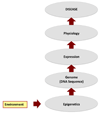Epigenetic transgenerational actions of environmental factors in disease etiology
- PMID: 20074974
- PMCID: PMC2848884
- DOI: 10.1016/j.tem.2009.12.007
Epigenetic transgenerational actions of environmental factors in disease etiology
Abstract
The ability of environmental factors to promote a phenotype or disease state not only in the individual exposed but also in subsequent progeny for successive generations is termed transgenerational inheritance. The majority of environmental factors such as nutrition or toxicants such as endocrine disruptors do not promote genetic mutations or alterations in DNA sequence. However, these factors do have the capacity to alter the epigenome. Epimutations in the germline that become permanently programmed can allow transmission of epigenetic transgenerational phenotypes. This review provides an overview of the epigenetics and biology of how environmental factors can promote transgenerational phenotypes and disease.
Copyright 2010 Elsevier Ltd. All rights reserved.
Figures


References
-
- Szyf M. The dynamic epigenome and its implications in toxicology. Toxicol Sci. 2007;100:7–23. - PubMed
-
- Haas GP, Sakr WA. Epidemiology of prostate cancer. CA Cancer J Clin. 1997;47:273–287. - PubMed
-
- Brenner H, Rothenbacher D, Arndt V. Epidemiology of stomach cancer. Methods Mol Biol. 2009;472:467–477. - PubMed
-
- Kukreja A, Maclaren NK. NKT cells and type-1 diabetes and the "hygiene hypothesis" to explain the rising incidence rates. Diabetes Technol Ther. 2002;4:323–333. - PubMed
Publication types
MeSH terms
Substances
Grants and funding
LinkOut - more resources
Full Text Sources
Other Literature Sources
Medical

